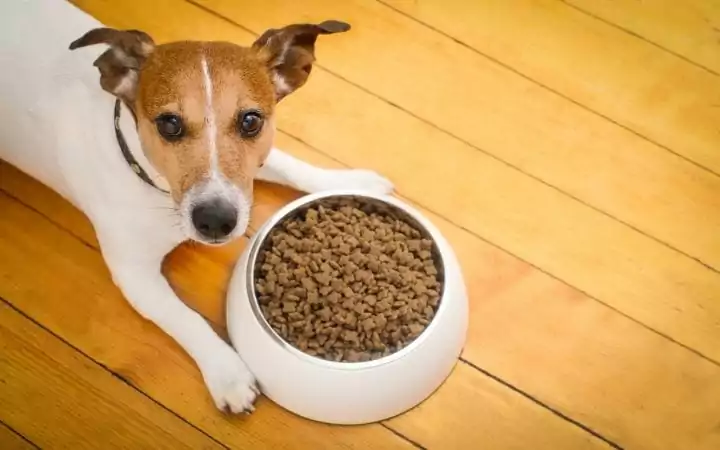The kidneys play a vital function in your dog’s overall health. They produce certain hormones, waste toxins materials through the formation of urine, conserve a healthy fluid balance and pH. But… What happens when the kidneys stop functioning normally?
In this article, we will give you an insight into kidney failure in dogs.
What is kidney failure in dogs?
Kidney failure in dogs is a broad term to define the outcome of numerous conditions where the functions of the kidneys are affected. There are two main types of kidney failure: acute kidney failure and chronic kidney disease.
Acute kidney failure is when the dog presents a sudden kidney dysfunction. It can often be reversible with prompt treatment.
Chronic kidney disease in dogs is a progressive and irreversible condition where the kidney is unable to filter the waste products in the blood properly. This condition is slow-acting and can be present for years before it is diagnosed. However, with proper management, dogs can have a good quality of life for a long time. Chronic kidney disease (CKD) is also known as chronic renal failure and chronic renal insufficiency.

What causes kidney problems in dogs?
Acute kidney failure in dogs usually starts with the ingestion of poisonous substances, toxins, food, or drugs, such as:
- Antifreeze (ethylene glycol)
- Grapes and raisins
- Non-steroidal anti-inflammatory drugs (NSAIDs) including ibuprofen
- Consumption of high levels of vitamin D
Other causes of acute kidney failure in dogs include:
- Urinary blockage
- Shock (lack of blood flow)
Aging is often related to chronic kidney disease. The tissues of the kidneys start to deteriorate as the dog enters into geriatric years. Large breed dogs may present signs of kidney failure when they are seven years of age. Small breed dogs may show symptoms of chronic kidney disease between the ages of ten and fourteen.
Other causes of chronic kidney disease in dogs are:
- In young dogs, the leading cause is congenital, meaning that the condition is present from birth. It is mainly due to genetic problems or inheritance.
- Cancer
- Diabetes mellitus
- Leptospirosis (zoonotic bacterial infection)
- Glomerulonephritis (inflammation of the glomeruli)
- According to the International Renal Interest Society (IRIS), some breeds are more prone to CKD. These breeds are Bull Terriers, Shar Pei, English Cocker Spaniel, Cavalier King Charles Spaniel, Boxer, and Highland White Terrier.
What are the signs of kidney failure in dogs?
Signs on kidney failure in dogs vary depending on the stage, the severity of the case, and the underlying cause. Some general symptoms are:
- In the early stages, it is common to see an increase in urination (polyuria) and thirst (polydipsia).
- Weight loss as a result of a poor appetite.
- Vomiting
- Bad breath (halitosis)
- Diarrhea
- Seizures
- Blood in the dog’s urine (hematuria)
- Sudden blindness (less common)
Treating kidney failure in dogs
If your veterinarian suspects kidney failure in your pooch, they will perform a blood test to evaluate the function of other organs and measure waste product levels. Your vet will also take a urine sample to be analyzed for kidney function.
Treatment of kidney problems in dogs depends on the cause, severity, and whether it is acute or chronic. The procedure may involve:
- Intravenous-fluids (diuresis) to aid the process of flushing out the waste products in the kidneys and bloodstream and improving hydration. IV-fluids also work to treat electrolyte imbalance. Your vet may also suggest dialysis if diuresis is not successful.
- Further treatment for any primary condition or cause.
- Monitoring your pet for any other symptoms and regular visits to your vet for check-ups, adjustment of treatment, and additional tests.
- Special diets that are low in phosphorus, protein, and sodium.
How can kidney problems be prevented?
Acute kidney failure may be prevented with the following measures:
- Making sure that poisonous substances such as antifreeze and toxic human foods like grapes and raisins are out of reach from your canine companion. It is also important to supervise your dog when he is outside.
- Keeping NSAIDs and other drugs in a safe place.
- Maintaining up-to-date core vaccinations and non-core vaccinations depending on individual cases.
- Promoting water consumption by changing your dog’s water every day.
Due to the main causes of chronic kidney disease (aging, congenital, and genetic), most cases cannot be prevented. However, with constant visits to the vet and examinations, there is a higher likelihood of early diagnosis.

If my dog improves, is treatment concluded?
Chronic renal failure is irreversible, and home treatment is essential for the proper management of the condition and quality of life of your pet.
As mentioned before, a special diet for your canine companion is vital for treatment. The nutrition must be:
- Restricted in protein to reduce the effort of the kidneys to remove waste products.
- Low in sodium to inhibit the increase in blood pressure.
- Low in phosphorus to prevent structural damage due to an imbalance and limit the risk of secondary hyperparathyroidism.
The introduction to the new diet should be gradual by reducing the amount of their regular food and increasing the amount of the special diet. Consult your vet for brands that will meet your dog’s needs.
Your dog must have access to freshwater to maintain hydration. They are losing an excessive amount of water when urinating.
Additional treatment at home:
- If your dog has lost an extreme amount of potassium, your vet may prescribe a potassium supplement to avoid hypokalemia.
- Fluids at home may be a further treatment that will benefit your pet. Consult your vet before giving your dog fluids.
- Drugs such as anti-emetics to control vomiting if present. Medications to manage blood pressure may also be needed.
Veterinary cases of kidney diseases
Summary
The prognosis of a dog with kidney failure will depend on many factors: severity, cause, acute or chronic, early diagnosis. As dog parents, we must do everything that is in our hands to give our dogs the quality of life they deserve. If your pooch is diagnosed with CKD, it is essential to follow your vet’s advice and continue with treatment at home.
World Veterinary Day is coming! It is a celebration to show your gratitude for everything your vet is doing for your beloved friend. Read this blog post for some unique ideas to make your veterinarian’s day!




